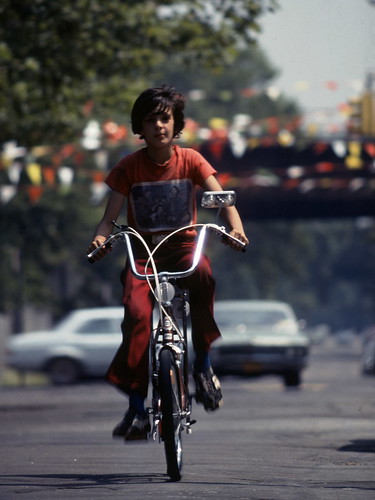The Truth You Know Isn’t Always The Truth
Posted by Mitch Mitchell on Jun 7, 2017
When I was eight years old, I asked my dad if I could have a new bicycle. We'd gone to the gas station, and there was this new style of bike, at least new at the time, called a banana seat bike. No one else had one, and I wanted to be the first to own one.
 via Compfight |
I also wanted a new bike was because the bike I had was considered a girl's bike by American standards, as I'd gotten my bike in Japan on my 5th birthday, when all bikes there came without the bar going across the top. My dad bought me that bike a few months before my 9th birthday, and I loved that bike and rode it around everywhere.
A couple of months later, before my 9th birthday, I was riding my bike in the street and there was a car coming toward me. Because it was on a military base, it wasn't driving all that fast, so I knew I could beat it across the street and up onto the curb.
When I got to the curb, I lifted the front of the bike, which I'd done hundreds of times with this bike and my other bike, without a care in the world. The next thing I know, the front of the bike went out on me and I found myself tumbling to the ground. My chin hit the pavement, I screamed out loud and my dad was there within seconds. He picked me up, got me to the car, and drove me to the dispensary, which was the name of the small medical facility we had on the base. They put stitches in my chin, and unfortunately I ended up missing the movie Jungle Book. lol
I always knew I'd messed up somehow, and kept trying to figure it out for a few years. I was usually very precise, as I'd done a few tricks that I later realized were pretty dangerous, especially since I was often alone when I was doing these things. It was the only real accident I ever had in my life, which means I was pretty lucky, but because I didn't have anything to gauge it against, it was something I never let leave my mind.
Three decades later, my wife and I were visiting my parents house out of town when I regaled them with this story. I got to the conclusion and my mother was horror struck, never having heard the story. When I was hurt she was upset, so neither Dad or I had ever told her what had happened.
All of a sudden, Dad said "That's not how it happened." I said "That's how it happened because it happened to me." He said "No, that's not how it happened because I was watching and it was my fault."
 |
He said he was watching me riding the bike out of the screen door when I went to jump the curb with my bike. When I pulled the bike up, instead of it landing like it normally did the front part of the bike separated from the rest of the bike and that's why I had the accident. He got to me within seconds because he was watching, but he was also horrified.
It turns out he'd put the bike together, which I didn't know, and he hadn't screwed everything on properly, therefore, it was never my fault, but his. I asked him how come he didn't tell me all those years ago, and he said because my mother would have killed him, which is why he'd never told her either. On a side note, it explains why my expensive 10-speed bike many years after never worked properly, as he tried putting that one together also. 🙂
Someone once said there's the truth and then there's the real truth. It turns out that's sometimes true, probably more often than we know. When we're in leadership, one of the things we always need to verify is whether our version of the truth is the real truth.
As someone who has pretty good recall of events, which I've been told more often than not, I like to think that I can view everything as a story that's going on, whether it involves me or not, and recall it accurately later on. However, every once in a while I've had to ask multiple people if what I thought I saw or experienced is what actually happened. Most of the time I've been spot on, but there have been enough times where I've realized I didn't have enough background information to get it totally right. Not that my truth was incorrect; rather, it was incomplete.
Many times as a consultant I go into situations where I talk to department directors who tell me one thing and then have their employees tell me something different. What I've found is the directors tell me how things are supposed to go; the employees tell me how things actually go.
As a leader, you want to make sure you get things right based on proper information. It never hurts to ask confirming questions to either make sure you're correct or to see if you missed something. Your employees, coworkers and friends will respect you for it. As Galileo said:
"All truths are easy to understand once they are discovered; the point is to discover them."


A wonderful story and an excellent point made throught it, Mitch. Thanks for sharing this lesson.
Thanks Margaret. I learned a lot through Dad, both directly and indirectly. lol